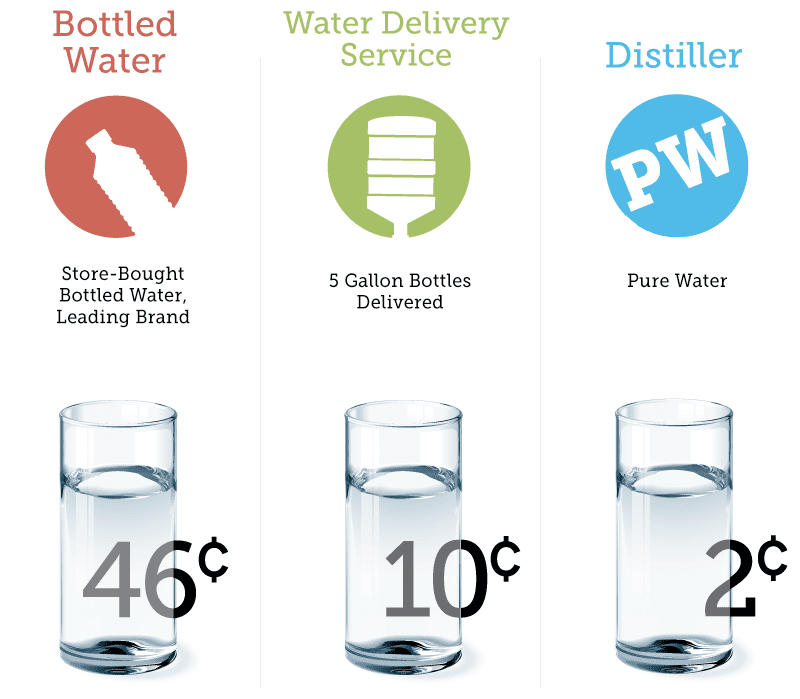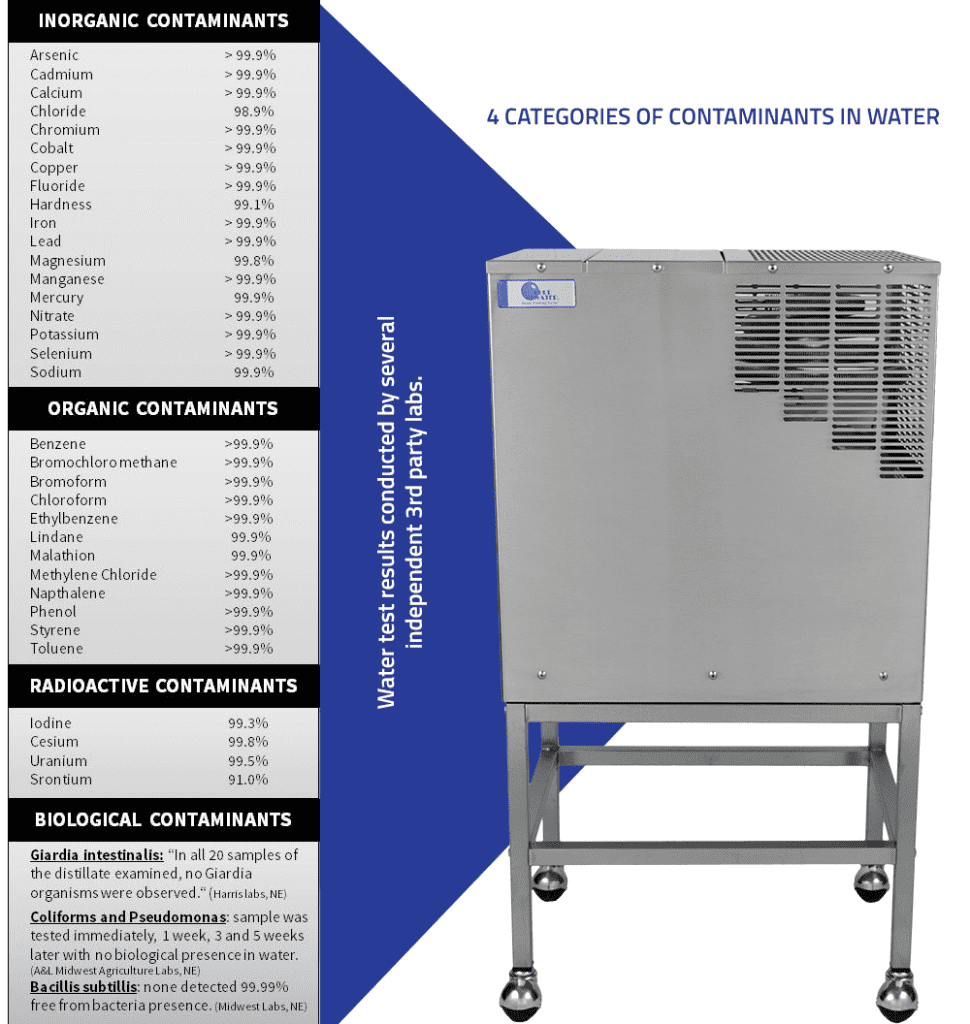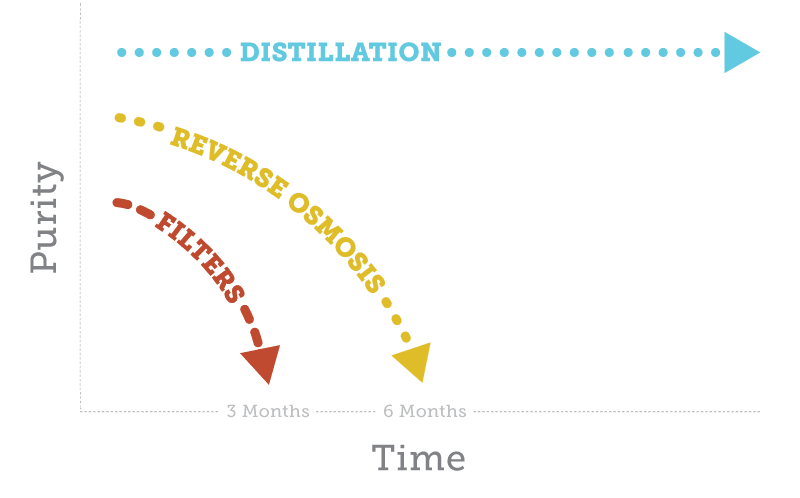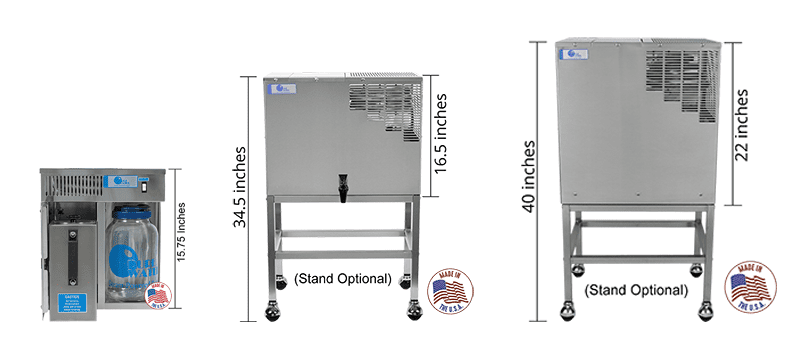Should You Buy a Water Distiller?
Many people wonder if water distillers are worth the money, so we thought we would break down the pros and cons of owning a water distiller versus other options from tap water to pitcher filters, bottled water, and reverse osmosis systems. By the end of this article, we think you will agree that Pure Water distillers are the best home water distillers and the right solution if you want the cleanest, safest, natural and healthiest drinking water on Earth.

Cost of Distilled Water
Pure Water Distillers are proudly made in the USA and come in manual countertop and automatic models. Also, Pure Water Distillers produce 99.9% pure vapor distilled water in a natural process that mirrors the hydrologic cycle. The cost of distilled water depends on how often you use it. On average, it will cost about 2 cents a glass to produce pure water with our distillers, including the cost of water and electricity to run it.
The initial cost of a Pure Water Distiller can be between $635 to roughly $5,000 depending on the model you choose. (Financing options are available). The benefit of buying a Pure Water Distiller over a cheaper small plastic model is that ours last for many years, and our larger units make many gallons of distilled water daily. If you look at the production of the cheaper models plus note that some allow plastic parts to come in contact with your water, you will see why Pure Water Distillers are the best. In addition to that we sell all of the water distiller parts that you might need to make minor repairs to your machine. Pure Water brand water distillers are not like cheap distillers that you throw away within a few years. Lastly, our water distillers are made in the USA!
Benefits of Owning a Pure Water Distiller
- High Purity Drinking Water
- Reduce Plastic Waste
- Reduce Trips to Store
- Easy to Maintain
- Water Distiller Parts Available
- 304 Grade Stainless Steel
- Lower Cost than Bottled or Delivered Water
- Emergency Water (Automatic Units Have Storage Tanks)
- Mirrors the Water Cycle (Nature’s Way to Purify Water)
- Chemical Free Water
- Virus Free Water
- Bacteria Free Water
If you are considering a water distiller because you are concerned about your water quality, you are an educated consumer. The truth is that no one really knows what’s in their local tap water from day to day. The government tests for a specific number, but not all contaminants. There are pharmaceuticals, microplastics, and other toxins that could be in our water, and we don’t even know it. If water does become contaminated due to a water line break, pesticide runoff, or chemicals being dumped, a Pure Water Distiller provides you with peace of mind. Take a look at the contaminants we’ve tested for and how our well water distillers remove them. Also, don’t forget that the storage tanks in our automatic distillers allow you to have clean emergency water in case of a power outage.
If you are looking for clean, safe, pure water, then water distillers are worth the money as long as you buy a Pure Water Distiller. We can help you select the right one for your needs, and it may be the last one you ever need! Give us a call at 1800-875-5915 or email us info@mypurewater.com for assistance and to learn more about financing options.
Testimonials
Buyer: little red hen
5.0 out of 5 stars HAVE HAD MINE FOR 10+ YEARS; WORTH ITS WEIGHT IN GOLD!!! LOVE LOVE LOVE
Reviewed in the United States on February 2, 2017I bought this machine about 10 years ago when the water delivery service to my small apartment got to be more than $90 a month. I am SOOOOO glad I did. This is a solid, well-crafted machine without the built-in obsolescence that most appliances have now a days. It paid for itself in 6 months.
Buyer: SB95z
5.0 out of 5 stars You get what you pay for
Reviewed in the United States on October 14, 2014
Verified PurchaseI bought this based on the other reviews (and months of looking/research) and so far I’m really happy with this distiller! Delivery was spot on with good packaging.
As others have mentioned, the build quality seems quite good. All stainless and a simple yet very well laid out design. The machine has produced about 25-30 batches so far and everything seems to be working perfectly. I actually measured the output volume and I get approximately 13 cups of pure water in the glass jar per cycle. The owners manual has a parts list breakdown and you can order replacement items on their website if something breaks.
Update July 2015: after 1 year; this machine has produced without fail for a year now. Not a single problem at all!
Update December 2016: well this unit just keeps working, flawlessly. For over 2 years we make about 5 gallons per week so I have easily produced over 500 gallons to date. Just clean the boiling chamber regularly and change the
Update July 2017: Our unit simply keeps chugging along, not a single problem for 3 years. I wish everything could be this reliable. I was thinking to order a replacement heating element just in case this one went out but since I know the reliability is great I may just put the $$ towards upgrading to a larger unit. Best purchase I ever made!
Other Drinking Water Options
Tap Water
Tap water is readily available, but many people turn away from tap water due to taste, odor, or appearance. Many of us strive to drink 8 glasses of water a day, but find that tap water isn’t very appealing. Have you ever been really thirsty and filled up a glass with tap water only to see small particles swirling around inside? Have you wondered why your water smells funny or tastes odd? You are not alone. While tap water is often deemed “safe,” there are many reasons you wouldn’t want to drink it. Even if it looks okay, your tap water could contain lead, arsenic, nitrates, uranium, pesticides, pharmaceuticals, bacteria, or even viruses. By the time you hear of a boil alert in your area due to contamination, you may have already unknowingly consumed the water, making you or your family sick. The bottom line is you can never be 100% sure that your tap water is safe.
Water Pitcher Filters
Because of taste and smell issues, many people turn to pitcher filters. The cost of purchasing the pitcher and the number of filters you will need yearly can vary depending on brand and use. If you change your filter as often as you should, you will probably spend between $30 – $90 a year per person on filter changes. Pitcher filters do seem to improve taste, appearance, and odor of tap water. The problem with pitcher filters is what you can’t taste or see. For example, if you are in an old house and your pipes are leaching lead into your drinking water, it can taste just fine. Many don’t know that lead can taste a little sweet. You might only know that you have lead in your water when it’s too late. By that time, it has affected you and your family adversely. Other contaminants like arsenic, nitrates, and viruses may not have any taste at all. As we all know, contaminants like lead are a real problem. One heartbreaking example is Flint, Michigan, where they are still reeling from the damages done.
Bottled Water
Another very popular option is bottled water. It is convenient and generally tastes, smells, and looks better than tap water, even though many brands are just filtered tap water. The most significant downsides to bottled water are cost and its substantial environmental impact. The plastic waste plus the energy consumed to create and distribute it is overwhelming.
Think of all the plastic bottles being produced and shipped all over the country. Then consider the amount of plastic that heads straight for the landfills after use. Did you know that more than 60 million plastic bottles end up in landfills every day? That’s just crazy! Recycling all those plastic bottles isn’t enough to offset the cost, either. Moreover, it is believed that Americans spend $100 per year per person on bottled water on average.
Reverse Osmosis
Some consumers seek out other options, such as a reverse osmosis system. While RO tends to remove some contaminants and reduce odors and bad taste, it has its downsides too. One is the cost of purchase and cost of upkeep. Reverse Osmosis membranes need to be replaced pretty frequently. In addition to that, many RO systems produce a lot of water waste. When water is already a precious commodity, and its cost is going up, not many want to waste up to 4 gallons of water to produce 1 filtered gallon. Reverse Osmosis systems can cost anywhere from a few hundred dollars to a few thousand. The cost of maintenance depends on local water quality and the cost of membrane and filter changes.
Distillation is the water purification industry’s best-kept secret. The big companies focus on filters and RO because there’s a lot of money in it for them. They are consumable and always need replacement, which is good for repeat business. They don’t want you to know there’s a much more effective option that costs a lot less over time.
The Best Drinking Water from the Best Water Distiller!
From a consumer standpoint, purchasing a distiller comes with minimal upkeep, and you’re set for decades! In fact, resellers tell us that we ‘overbuild’ our equipment because it lasts so long. We’re passionate about distillation because we’ve seen its effectiveness and superiority over other methods, and we can’t, in good conscience, recommend anything less! There are simply so many benefits of distilled water use.
There are many options out there for drinking water, but the best one is Pure Water distillers. We are the gold standard for water distillation, and providing clean highly purified water is our passion. With over 50 years in the water business, we know that it is the healthiest, most cost-effective, most environmentally friendly way to obtain pure drinking water.
Shop for Home Water Distillers Now!
Read More About Distilled Water
Reverse Osmosis versus Distilled Water
Should I Use Distilled Water Throughout My Entire Home?






Will this distill pool water in case of an emergency?
While the distillation process will remove contaminants from pool water, it is not recommended. The high levels of chlorine in pool water will wreak havoc on the stainless steel potentially causing pitting and rusting due to the vaporization temperatures of these contaminants.
Very interested in making distilled wate and.make a business.. Our community waterhas had numerous boiled water advisors..
Is the water distilled acidic?
Great question! When the water is freshly distilled, the pH will be extremely close to a neutral 7. Over time, depending on how the water is stored, it will absorb some carbon dioxide from the air. This makes it slightly acidic. If you would like it to be more alkaline, an easy way to alter it is to add just a pinch of baking soda. Please let us know if you have additional questions. Thanks!